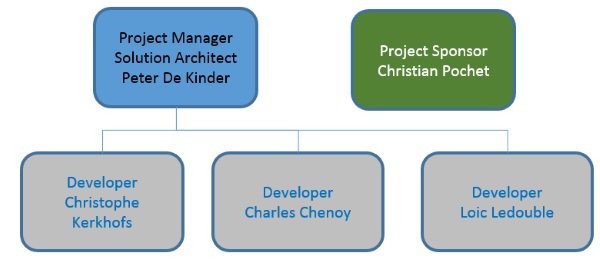FPS Employment, Labour & Social Dialogue - AGORASeptember 2010 - July 2011Content: |
 |
Management Summary
In Belgium, the lion’s share of the salary negotiations for the private sector is done in paritary committees. These committees consist of representatives of both the employers and employees. Such a committee is presided by a social negotiator working for the Federal Public Service Employment, Labour and Social Dialogue. The need exists to visualize the result of these negotiations per committee for all periods in time on the internet site of the Federal Public Service Employment, Labour and Social Dialogue, as well as the need for these information sets to be intuitively adaptable by the proper people. This project entails the design and implementation of a system for publishing an editing salary decisions made by the Paritary Committees, as well as automate indexation mechanism and perform trend analysis on the indexation.
Team Composition

Lessons Learned
Next to the algorithms needed for indexation calculations, an additional difficulty was to wane the users of the department off of using Excel. Even if it has great functionality, the lack of collaboration possibilities and online storage necessitated another approach. The idea was to construct a User Experience similar to Excel (with some of the same functionalities), but online and persisted to a database. The applet needed to be signed because of the requirement of the users to upload csv files from their machines directly into the online spreadsheet. This is because an unsigned applet does not have the proper security rights to read files from the system. In essence, a signed applet is considered trusted, and can then perform the following actions:
- open a socket connection to a server that is different from the web server that hosts the applet
- access the user’s local filesystem
- read certain system properties (e.g. user.home, java.home, …)
The developed applet would have its lifecycle closely linked to the scope of the web page. Upon loading the web page, the applet would become initialized and started, and would subsequently be stopped and destroyed in the JVM container the moment the page was abandoned by the user. This was achieved using the onLoad and onbeforeunload events of the HTML specification.

Java Applet Lifecycle
Although Google Docs (and thus Spreadsheets) went live in august of 2010, and would have served nicely for this project, it was not yet widely known, and there was a lack of trust for sensitive data being stored in the Cloud. As it was to be used by a limited set of people, the use of an embedded signed applet was preferred over elaborate javascript coding using ajax calls. This is a decision that was later proved wrong, as the web development world turned more towards HTML5 and Javascript libraries to address these types of requirements.
| Project | Silo Architecture | Public Sector |


